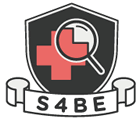Resources
This resource is to give you some practical information to assist you in practicing EBHC. One general resource, the EBM toolkit: includes useful information and resources related to all the key steps of EBHC. It includes critical appraisal guidelines for various study designs.

The UK Cochrane Centre have a project to engage students of all disciplines, in any part of the world, with evidence e-based healthcare. The main aim is to get even more students engaging with the Students 4 Best Evidence network, whether through the website (www.students4bestevidence.net), or through the Facebook page (www.facebook.com/Students4BE), or on Twitter (@Students4BE); writing blogs, review evidence-based resources and starting discussions on the site.
The key first step is to phrase your question clearly. A guideline to the right phrasing of the question is to use the PICOS principle.
PICO principle to phrase a question:
| P | Participant (who) |
| I | Intervention (what) |
| C | Comparison (compared to what) / Context |
| O | Outcome(s) |
| S | Study design (which study design will give you the best answer) |
SEARCH TIPS
- Approach to searching
- Searching PubMed using MeSH terms
DATABASES TO SEARCH FOR RELEVANT STUDIES
| Source | Description | URL |
| The Cochrane Library | The Cochrane Library is a collection of six databases that contain different types of high-quality, independent evidence to inform healthcare decision-making, and a seventh database that provides information about groups in The Cochrane Collaboration | www.thecochranelibrary.com |
| PubMed | PubMed comprises more than 21 million citations for biomedical literature from MEDLINE, life science journals, and online books. Citations may include links to full-text content from PubMed Central and publisherweb sites | www.pubmed.com |
| CINAHL | The CINAHL Plus (Cumulative Index to Nursing and Allied Health) database contains bibliographic references (books, dissertations, standards of professional practice, and educational software) to nursing, allied health, biomedical, emergency services, occupational therapy, physical therapy, respiratory therapy, surgical technology, physician’s assistant and consumer health journals. | www.ebscohost.com/cinahl/ |
| Trip database | The TRIP Database is a clinical search tool designed to allow health professionals to rapidly identify the clinical evidence for clinical practice | www.tripdatabase.com |
| Essential Evidence Plus | Essential Evidence Plus is an evidence-based, point-of-care clinical decision support system, giving access to guidelines, abstracts, and summaries (POEMs) | www.essentialevidenceplus.com |
EBM toolkit includes critical appraisal guidelines for various study designs.
APPLY: Apply results of the appraisal into clinical practice
In considering the application of research findings, i.e. generalizability, to your own setting the following approach is useful:
- Were the study participants similar to the patient in your practice?
- Does your patient match the study inclusion criteria?
- If not, are there compelling reasons why the results should not apply to your patient?
- Were all clinically important outcomes considered?
- Do the results of this study fit with other available evidence?
- Are the benefits worth the costs and potential risks?
Once you have decided to use the results from a study it is important to assess / evaluate your practice to see how it worked. See the EBM toolkit for more information.

